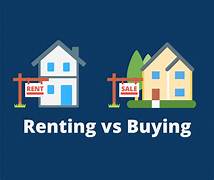One of life’s most significant financial decisions is whether to rent or buy a home. Each option has its own set of advantages and disadvantages, making the choice a complex and personal one. This article will explore the pros and cons of both renting and buying a home, helping you make an informed decision based on your individual circumstances and priorities.

Renting a Home:
Pros:
- Flexibility: One of the most significant advantages of renting is flexibility. Renters have the freedom to change homes more frequently, making it an ideal option for those who value adaptability in their living arrangements. Whether it’s for career opportunities or a desire to explore different neighborhoods, renting allows you to do so without the commitment of homeownership.
- Lower Upfront Costs: Renting typically involves lower upfront costs compared to buying a home. You don’t need to make a substantial down payment or cover the expenses of property taxes, insurance, and maintenance. This makes it more accessible for people with limited savings.
- No Maintenance Responsibilities: When you rent a property, the responsibility for maintenance and repairs usually falls on the landlord. You won’t have to worry about fixing a leaky roof or replacing a malfunctioning HVAC system, which can save you time and money.
- Predictable Expenses: Renters often have more predictable monthly expenses, as they know exactly how much they’ll pay in rent each month. This can make budgeting more straightforward, allowing you to allocate your finances to other priorities.
- Amenities: Many rental properties come with amenities like fitness centers, swimming pools, and communal spaces. These extras can enhance your quality of life without the added cost and responsibility of ownership.
Cons:
- Lack of Equity: Renting does not build equity in a property. When you make monthly rent payments, that money is essentially gone, unlike mortgage payments that contribute to your ownership stake in a house.
- Limited Control: Renters have limited control over the property. You may need the landlord’s approval for changes or improvements, and they can choose not to renew your lease when it expires.
- Rent Increases: Landlords have the right to increase rent when leases renew, potentially causing financial strain if you’re not prepared for higher housing costs.
- No Tax Benefits: Renters don’t enjoy the tax benefits associated with homeownership, such as mortgage interest deductions.
- Uncertain Future: Renting can feel less stable than homeownership, as you’re subject to the landlord’s decisions, including selling the property or not renewing your lease.
Buying a Home:
Pros:
- Building Equity: One of the most significant advantages of buying a home is the opportunity to build equity. Over time, your mortgage payments contribute to your ownership stake, and as the property’s value appreciates, your net worth can increase.
- Stability: Owning a home provides a sense of stability and security. You have control over your property, and as long as you meet mortgage payments, you can stay in your home indefinitely.
- Tax Benefits: Homeowners can enjoy various tax benefits, including deductions for mortgage interest, property taxes, and certain home improvement expenses. These deductions can lower your overall tax liability.
- Investment Potential: Real estate can be an excellent long-term investment. If property values in your area increase, your home’s value can appreciate, potentially allowing you to sell it for a profit in the future.
- Customization: As a homeowner, you have the freedom to customize and renovate your home to suit your preferences and needs without seeking permission from a landlord.
Cons:
- High Initial Costs: Buying a home involves significant upfront costs, including a down payment, closing costs, and ongoing expenses like property taxes, insurance, and maintenance. This can be a barrier for those with limited savings.
- Limited Flexibility: Homeownership ties you to a specific location, which can be problematic if you need to relocate for work or personal reasons.
- Maintenance and Repairs: Unlike renters, homeowners are responsible for all maintenance and repair costs. These expenses can add up over time and require both time and money.
- Market Risk: The real estate market is subject to fluctuations, and there is no guarantee that your property will appreciate in value. Economic downturns can lead to a decrease in home values.
- Less Liquidity: Real estate is less liquid than other investments. Selling a home can take time, and you may not be able to access your equity quickly in times of financial need.
In conclusion, the decision to rent or buy a home should be based on your individual circumstances, financial goals, and lifestyle preferences. Renting offers flexibility and lower initial costs but lacks the long-term financial benefits of homeownership. On the other hand, buying a home provides stability, potential for equity growth, and tax advantages but comes with higher upfront expenses and maintenance responsibilities.
Before making a decision, carefully evaluate your financial situation, future plans, and personal priorities. It may also be beneficial to consult with a financial advisor or a real estate professional to help you make an informed choice that aligns with your unique needs and goals. Ultimately, whether you choose to rent or buy, the key is to ensure that your housing decision aligns with your overall financial strategy and lifestyle objectives.
